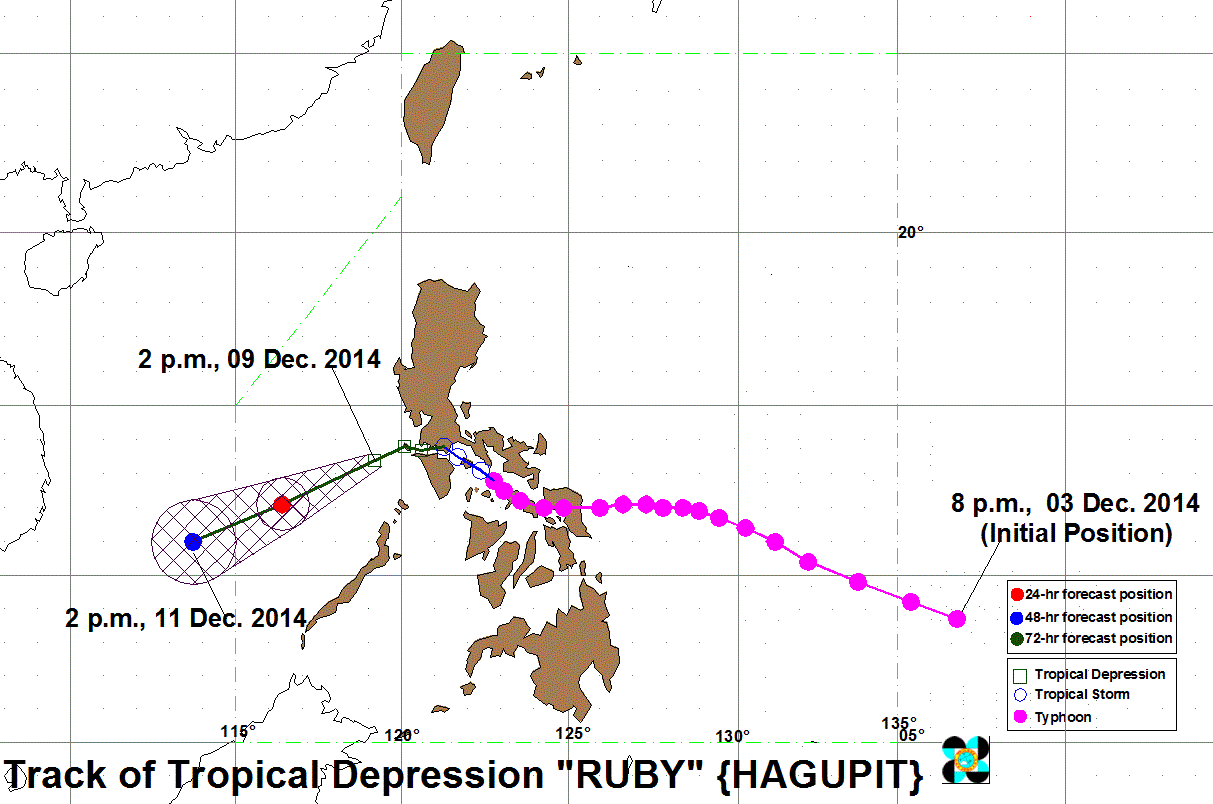Safety & Security During Typhoon - What Your Nose Can Do
Now that Ruby (Hagupit) has weakened to tropical depression status and expected to leave Philippine Area of Responsibility on December 11 (GMT +8), we examine what could have been done differently that may save more lives and properties. Let our noses help secure our properties and assure safety of our loved ones.
 |
| Ruby Forecasted Path Image c/o PAGASA-DOST |
PRE TYPHOON
1. Smell of rice, canned goods, instant noodles and ready-to-eat packed food and medicine
Satisfy your sense of smell and taste during typhoon by stocking up on basic food - carbohydrates, sugar, and fluids. Prepare enough for your family for at least 5-day worth of energy sustenance.
2. Smell of burnt chemical or burning wires
Secure all electrical connections in your house to prevent fire arising as soon as electric power is restored. Prior to the storm, try smelling plugs, outlets, and electrical wirings for burning wire scent. Visually check loose connections and exposed wires. Waterproof appliances and electric sockets if your area is prone to flooding.
3. Smell of molds and mildew
Expect your house to smell like mildew and molds as you restrict ventilation inside the house by closing and securing your doors, windows and roof. Have that scent of wood by boarding up windows with plywood.
4. Smell of clean clothes and blankets
Make sure to pack enough clothes and blankets for your family.
DURING TYPHOON
1. Smell of flood - stagnant water, canal
Watch out for flash floods, landslides and overflowing sewage, especially if you are prone to these. Evacuate if necessary. Follow the police, military and other local government officials. If power is shut off, turn off appliances and the main circuit breaker to protect your house from fire.
2. Smell of evacuation center
Maintain cleanliness in evacuation areas. Health and wellness are as very important to you as to others. If possible, bring your own toiletries and cleaning materials to the place. Maintain order and peace by adhering to local officials and nominating a leader from the evacuees. Empower evacuees by giving them direct responsibilities in maintaining safety and sanitation of the area.
3. Smell of howling wind and rain
Don’t go out as the torrential wind and rain are very dangerous especially if the gustiness speed is 100kph and up. It’s tantamount to being rundown by a bus! Also, expect flying debris and foreign objects, i.e. tin roof, tree trunks around. If you are unlucky, you might even see a flying car. Falling electric wires and posts will also be expected around.
On a positive note, take refuge from the idea that the storm is wiping away air pollution, cleaning up the mountains, washing away rivers and the seas and refilling our dams and watershed.
POST TYPHOON
1. Smell of mud, flood, and dirt
Don’t go back yet to your houses form evacuation centres unless you’re told to do so. Inspect your areas for possible floods and landslides or if they have subsided already. Check for fallen electric posts and wires and report to the electric company for proper clean-up and repair.
Inspect for dangerous objects around. Refrain from wading through flood waters if possible to minimise health issues, i.e. leptospirosis, etc.
2. Smell of pine, citrus and alcohol
Clean-up. Use your all-purpose cleaner or powerful detergent to remove flood and mud stains. Use products with pine as this is a powerful disinfectant plus it smells nice. You can also opt for liquid bleach or sodium hypochlorite based products.
For your personal needs, immediately clean yourself up if you were exposed to rain and flood. Soap and clean water will suffice. Rubbing alcohol will also be needed for general personal sanitation and hygiene.
3. Smell of charity
Not all of us will be lucky to survive the storm. Donate. Join relief efforts in your community.
Here is a list of reputable institution if you would like to help or donate:
- Department of Social Welfare and Development (DSWD)
- Philippine National Red Cross
- GMA Kapuso Foundation
- ABS-CBN Sagip Kapamilya
- Rappler's Project Agos
Our sense of smell should go hand in hand with our other senses, especially with the COMMON SENSE. We need this to minimise as much as possible casualty to property and lives by engaging all our senses.








0 comments:
Post a Comment